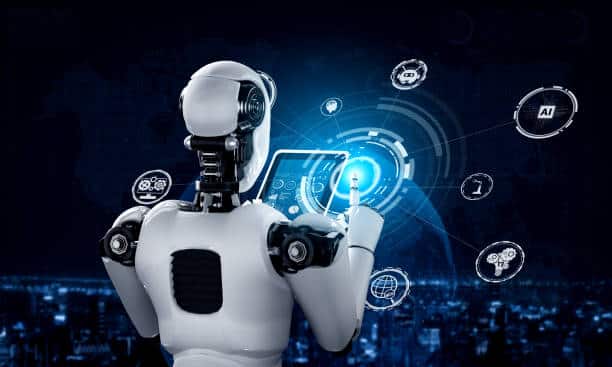The field of information technology (IT) has been transformed by artificial intelligence (AI). AI is rapidly changing the management, optimization, and innovation practices of IT professionals within their organizations. This article examines the significant impact that artificial intelligence (AI) is having on information technology, highlighting significant new developments and trends that are propelling this development.
Automation of Routine Tasks

The IT landscape is being transformed by AI’s capacity to automate routine and repetitive tasks. Traditionally, routine tasks like software updates, system monitoring, and data backups took up a lot of time for IT professionals. These tasks can now be handled effectively by automation tools powered by AI, allowing IT staff to concentrate on projects that are more creative and strategic. This change increases productivity and reduces human error, resulting in IT operations that are more secure and reliable.
Enhanced Cybersecurity
Cybersecurity is a major concern for IT departments, and AI is making a significant contribution to the improvement of security measures. Artificial intelligence calculations can dissect immense measures of information to identify abnormalities and likely dangers progressively. Cyberattack patterns can be predicted and identified by machine learning models, allowing proactive measures to prevent breaches. Additionally, AI-driven security systems are able to respond to threats more quickly than human counterparts, minimizing the impact of attacks and guaranteeing IT infrastructure integrity.
AI-powered predictive analytics are revolutionizing the way IT departments make decisions. AI is able to predict future trends and potential issues by analyzing historical data. Predicting system failures can save money and time in network management, where this capability is especially useful. IT teams can be notified of hardware or software issues by AI-driven predictive maintenance before they become more serious, ensuring smooth operations and enhanced service delivery.
Intelligent IT Service Management
The development of intelligent chatbots and virtual assistants is revolutionizing IT service management (ITSM). These AI-driven tools can handle common IT issues, assist with troubleshooting, and handle routine service requests. These virtual assistants can continuously improve their responses based on user interactions by integrating natural language processing (NLP) and machine learning, enhancing IT support services’ efficiency and user experience.
Improved Data Management

Data management is a key component of information technology (IT), and AI is significantly improving data management and utilization. The integration, cleansing, and transformation of data can be streamlined by AI algorithms, ensuring data consistency and quality. In addition, advanced data analytics can be made easier by AI, revealing insights that are the basis for strategic decision-making. AI is essential for managing and extracting value from the enormous amounts of information that businesses generate each day in the field of big data.
AI-Driven Development Operations (DevOps)
AI is taking DevOps to the next level, which is necessary for agile and effective software development. From coding to testing and deployment, AI can optimize various stages of the software development lifecycle. A few examples of how AI is enhancing DevOps include automated code reviews, AI-powered testing tools, and predictive analytics for release management. AI is accelerating the introduction of novel solutions to the market by speeding up the development process and enhancing software quality.
Personalized User Experiences
The capacity of AI to customize user experiences is significantly influencing IT services and products. AI can tailor interactions and recommendations to each user by analyzing user behavior and preferences. This personalization extends to IT support, where AI is able to anticipate user requirements and provide individualized solutions. By providing intuitive and pertinent functionalities, AI-driven personalization improves user satisfaction and productivity in enterprise applications.
AI in IT Infrastructure Management
The management of IT infrastructure is getting more and more difficult, and AI is proving to be a useful asset in this area. IT infrastructure components like servers, networks, and storage systems can be monitored and optimized by AI. Capacity issues can be anticipated and adjustments to resource allocation suggested by predictive analytics. In addition, AI has the capability of automating the provisioning and configuration of infrastructure resources, resulting in cost-effectiveness and optimal performance.
With improved decision-making capabilities
Enhanced decision-making AI is empowering IT leaders. Through data analysis, AI enables IT executives to make strategic decisions based on accurate information. AI, for instance, is able to identify patterns in IT performance, user behavior, and market demands, thereby directing investment in new initiatives and technologies. IT departments are able to align their strategies with the objectives of the organization, which contributes to the overall success of the business.
The Future of AI in IT

The future of AI in IT has a lot of room for improvement and innovation. The integration of AI technologies into IT will become more seamless and sophisticated as AI technologies continue to advance. Real-time decision-making will be improved and latency will be reduced thanks to emerging trends like edge AI, in which AI processing occurs closer to the data source. Additionally, new opportunities for IT innovation will emerge as a result of AI’s integration with blockchain and the Internet of Things (IoT).
Conclusion
In conclusion, AI has a significant and far-reaching effect on IT. The IT industry is being transformed by AI, which is improving cybersecurity, predictive analytics, personalized user experiences, and automating routine tasks. Efficiency, creativity, and strategic decision-making are being fueled by the incorporation of AI into IT infrastructure management, service management, and development operations. A new era of technological advancement and operational excellence will be heralded by AI’s role in shaping the IT future as it continues to develop.
IT departments are not the only ones who can adopt AI; To remain competitive and meet the growing demands of the digital age, it is necessary. A glimpse into a future where intelligent systems drive the next wave of technological progress is provided by the trends and innovations discussed in this article, which highlight the transformative potential of AI in information technology.

